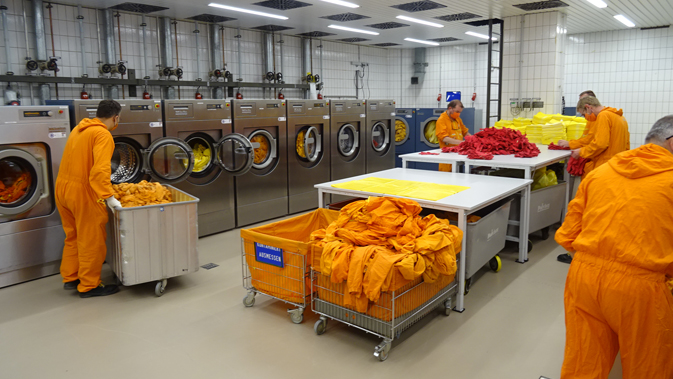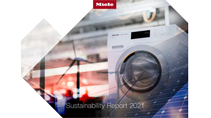Press releases
Employee protection at the highest level: Miele laundry technology in a nuclear power plant

-
Special programmes for reprocessing contaminated protective suits
-
Designed for over 70 tonnes of laundry in four weeks
Unit C of the Gundremmingen Nuclear Power Plant in Bavaria is set to be shut down by the end of next year, but will keep producing electricity until then. The staff here do not take their overalls, overshoes, socks or underwear home with them. In order to guarantee the health and safety of all employees, Unit C has its own laundry facility – which has been fully equipped with Miele technology since June.
The technology centre on the 30-hectare site has been using professional machines from Miele for some time. “Based on the extremely positive experiences we have had so far, we decided to opt for Miele's tried-and-tested technology once again for this round of investments,” says press spokeswoman Dr Christina Kreibich. The existing machines were built in 1984 and are still functional, but are no longer able to fulfil all aspects of today's hygiene requirements. The key factor, however, is the fact that the need for hygienically reprocessed protective suits and other laundry is set to increase massively: demolition work has begun in the previously decommissioned Unit B and will be under way in Unit C as well before too long.
“Quite apart from that, laundry volumes always increase automatically in early summer anyway,” explains the spokeswoman. This is because the power plant undergoes a revision – a full check-up under official supervision – every year: the entire plant is taken offline for four weeks so that safety checks can be carried out and fresh fuel can be supplied. This means that far more people than normal are on site – including numerous external experts – in order to carry out and supervise the work in this rigorously controlled area. In normal operation, around 270 overalls are washed per day, but in peak times this can increase to 1200 – with the addition of other textiles, this resulted in a total of 77 tonnes of laundry during the revision last year.
Washing machines with weighing plinth and automatic dispensing
Despite the coronavirus pandemic, the new laundry facility was ready in time for the 2020 revision. It is equipped with three washing machines with a drum capacity of 32 kilograms each, and a further six which can each accommodate loads of 14 kilograms. Weighing plinths in the machines measure the weight of the laundry so that the water and detergent can be dispensed precisely, with the detergent supplied by an automatic dispensing system. Miele has used new programmes to adapt all of the machines to a special-purpose detergent which only produces its best results when used with demineralised water. This ensures that contamination, fats and oils can be reliably removed. Normal tap water is then supplied for the final rinse cycle, as otherwise the textiles would draw salt and moisture from the skin when worn, resulting in dry skin for the wearer.
Two thirds less electricity consumption thanks to heat pump technology
Energy efficiency was also a key factor when it came to choosing Miele, particularly as the power plant will be shutting down its own production at the end of 2021 and will then have to buy in electricity. The nine Miele heat-pump dryers, each with a load capacity of ten kilograms, result in particularly high energy savings – with two thirds less energy consumption compared to conventional dryer technology. Furthermore, the low programme temperatures are gentle on the protective suits. The machines are also fitted with filter boxes which prevent fluff getting into the plant's piping system. Discharging the dryer air into the environment around the power plant would not have been possible.
The laundry has also been optimised in other ways, with more pleasant, daylight-like LED lighting and ergonomically adjustable tables. “We will be using the facility for another ten to 15 years,” explains Kreibich, as that is how long the demolition of Unit B and C is expected to take. Kreibich: “Any staff who are involved in processing recyclable materials such as stainless steel and concrete, for example, will need to be fully protected throughout this work.”
Company profile: Miele is the world's leading manufacturer of premium domestic appliances including cooking, baking and steam-cooking appliances, refrigeration products, coffee makers, dishwashers and laundry and floor care products. This line-up is augmented by dishwashers, washing machines and tumble dryers for commercial use as well as washer-disinfectors and sterilisers for use in medical and laboratory applications (Miele Professional). The Miele company, founded in 1899, has eight production plants in Germany as well as one plant each in Austria, the Czech Republic, China, Romania and Poland. These are joined by the two plants belonging to Miele's Italian medical technology subsidiary Steelco. Turnover in the 2018/19 business year was around € 4.16 bn, with a share of business outside Germany of approx. 71%. Miele is represented with its own sales subsidiaries and via importers in almost 100 countries/regions. Throughout the world, the family-run enterprise, now in its fourth generation, employs a workforce of around 20,500, whereof 11,050 are employed in Germany. The company has its headquarters in Gütersloh in Westphalia.
Download as PDF Download incl. media (zip)
Anke Schläger
+ 49 5241 89-1949
anke.schlaeger@miele.com
Media information
| Description | Download |
|---|---|

High-performance laundry: the staff who work here wear protective suits – as do all personnel in the controlled area of Unit C at the Gundremmingen Nuclear Power Plant. All of the workwear is hygienically reprocessed using Miele technology. (Photo: Kernkraftwerk Gundremmingen GmbH) |
|
| High Resolution JPG | |

Overalls, gloves, overshoes, underwear, towels: all of the textiles are sorted on the new tables which can be adjusted and adapted to the ergonomic requirements of different employees. (Photo: Kernkraftwerk Gundremmingen GmbH) |
|
| High Resolution JPG | |

Nine Miele heat-pump dryers ensure that the exhaust air is reused and is not discharged to the environment around the power plant – while also saving energy at the same time. (Photo: Kernkraftwerk Gundremmingen GmbH) |
|
| High Resolution JPG |


